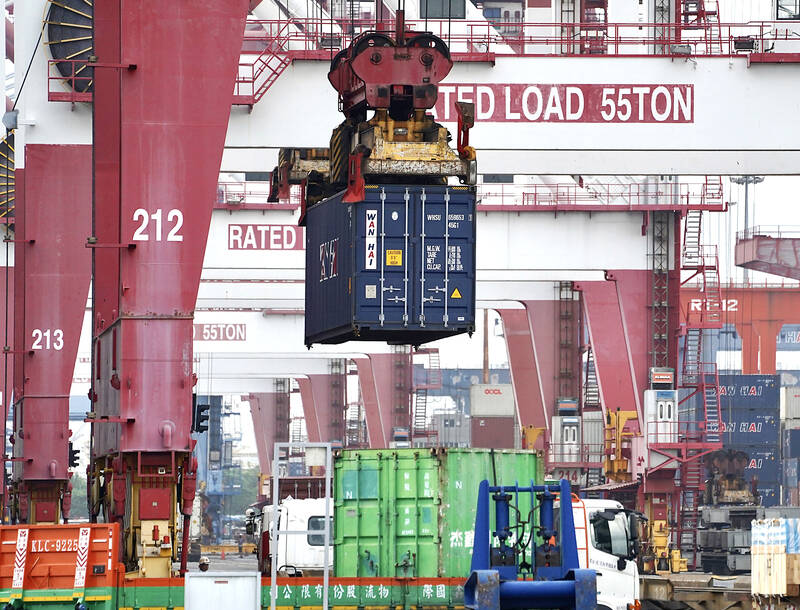Exports last month squeezed a 1.3 percent increase from a year earlier to US$31.43 billion, the second-highest for the same month despite holiday disruptions, as strong demand for artificial intelligence (AI) applications offset declines in all other product categories, the Ministry of Finance said yesterday.
The positive showing beat the ministry’s forecast of a retreat linked to fewer working days over the Lunar New Year and weak seasonality for technology products this quarter.
Stripping out the holiday effect, exports grew 9.7 percent in the first two months to US$68.62 million, driven single-handedly by information and communications technology (ICT) products, Department of Statistics Director-General Beatrice Tsai (蔡美娜) said.

Photo: CNA
“Exports have expanded for four months in a row, suggesting an evident, but uneven recovery,” Tsai said.
Broad-based recovery will have to wait for a few more months, likely in May or June, she said.
Tsai’s guarded optimism came after exports of electronics shrank 10.4 percent from a year earlier, while shipments of semiconductors fell 9.9 percent, the ministry’s monthly report showed.
Furthermore, shipments of optical and precision devices plunged 32.1 percent, while non-technology products posted decreases of between 8.6 percent and 26.4 percent, it found.
Taiwan is home to the world’s leading suppliers of electronics used in smartphones, personal computers, high-performance computing chips and vehicles, among other applications.
At the same time, exports of textile products and transportation tools weakened 16.8 and 16.3 percent respectively.
Tsai attributed the poor showings to a supply glut, as well as shipping schedule adjustments due to the Red Sea crisis.
Shipments of ICT products proved the only bright spot and more than doubled on the back of fast-growing AI investments and applications, Tsai said.
Scores of Taiwanese firms are responsible for supplying AI servers, graphics processing units and other critical components, in addition to advanced chips.
Things would improve in May and June, as the current quarter is the slowest season of the year, Tsai said.
Following the holiday disruptions, exports would expand by 9 to 13 percent, she said.
Imports tumbled a steeper 17.8 percent to US$23.55 billion, giving Taiwan a trade surplus of US$7.89 billion, 2.3 times the value a year earlier, the report found.
Imports of capital equipment slumped 44.3 percent, as local firms viewed the ongoing recovery as moderate and were cautious about capital spending, Tsai said.
By geographic breakdown, the US overtook ASEAN markets as the second-largest export destination with a 22.6 percent share, Tsai said, as AI demand stemmed mainly from US clients.
China remained Taiwan’s largest export partner, but its share fell to 29.2 percent as a result of domestic and external economic struggles, she said.
China is taking a hit from a property bubble at home and technology competitions and trade disputes with the US, the official said.

When an apartment comes up for rent in Germany’s big cities, hundreds of prospective tenants often queue down the street to view it, but the acute shortage of affordable housing is getting scant attention ahead of today’s snap general election. “Housing is one of the main problems for people, but nobody talks about it, nobody takes it seriously,” said Andreas Ibel, president of Build Europe, an association representing housing developers. Migration and the sluggish economy top the list of voters’ concerns, but analysts say housing policy fails to break through as returns on investment take time to register, making the

NOT TO WORRY: Some people are concerned funds might continue moving out of the country, but the central bank said financial account outflows are not unusual in Taiwan Taiwan’s outbound investments hit a new high last year due to investments made by contract chipmaker Taiwan Semiconductor Manufacturing Co (TSMC, 台積電) and other major manufacturers to boost global expansion, the central bank said on Thursday. The net increase in outbound investments last year reached a record US$21.05 billion, while the net increase in outbound investments by Taiwanese residents reached a record US$31.98 billion, central bank data showed. Chen Fei-wen (陳斐紋), deputy director of the central bank’s Department of Economic Research, said the increase was largely due to TSMC’s efforts to expand production in the US and Japan. Investments by Vanguard International

WARNING SHOT: The US president has threatened to impose 25 percent tariffs on all imported vehicles, and similar or higher duties on pharmaceuticals and semiconductors US President Donald Trump on Wednesday suggested that a trade deal with China was “possible” — a key target in the US leader’s tariffs policy. The US in 2020 had already agreed to “a great trade deal with China” and a new deal was “possible,” Trump said. Trump said he expected Chinese President Xi Jinping (習近平) to visit the US, without giving a timeline for his trip. Trump also said that he was talking to China about TikTok, as the US seeks to broker a sale of the popular app owned by Chinese firm ByteDance Ltd (字節跳動). Trump last week said that he had

STRUGGLING TO SURVIVE: The group is proposing a consortium of investors, with Tesla as the largest backer, and possibly a minority investment by Hon Hai Precision Nissan Motor Co shares jumped after the Financial Times reported that a high-level Japanese group has drawn up plans to seek investment from Elon Musk’s Tesla Inc to aid the struggling automaker. The group believes the electric vehicle (EV) maker is interested in acquiring Nissan’s plants in the US, the newspaper reported, citing people it did not identify. The proposal envisions a consortium of investors, with Tesla as the largest backer, but also includes the possibility of a minority investment by Hon Hai Precision Industry Co (鴻海精密) to prevent a full takeover by the Apple supplier, the report said. The group is